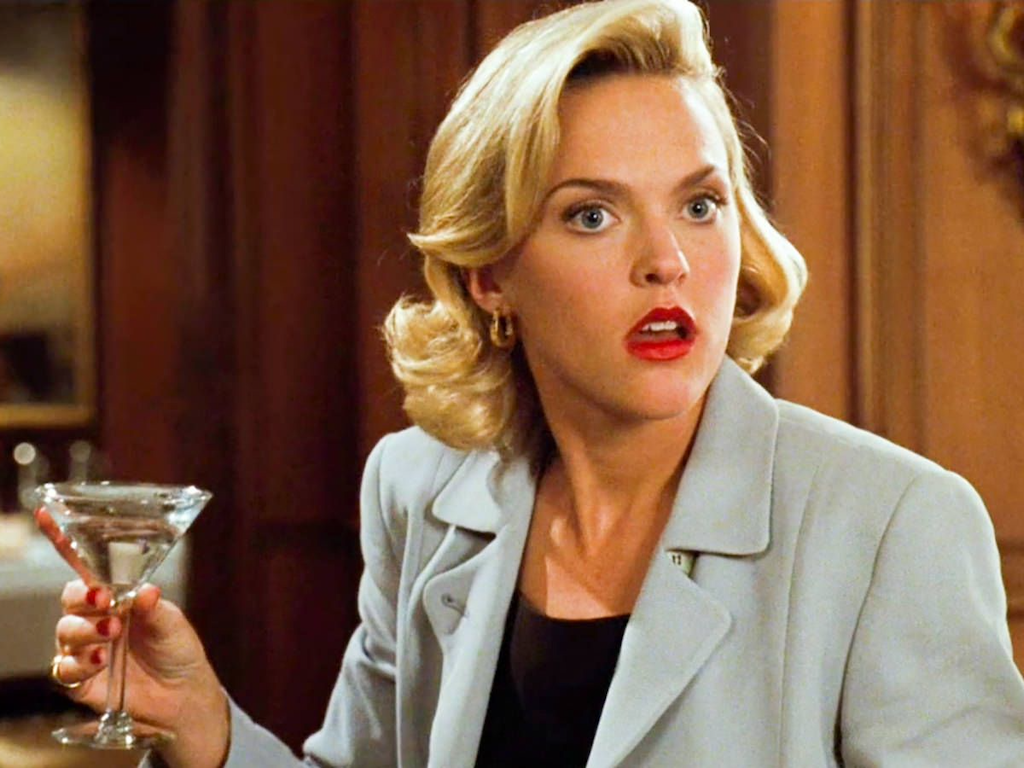If Emily Gilmore met Meredith Blake, would she:
a) try inducting her into the DAR
b) give her the Shira Huntzberger treatment
c) poison her martini
d) set her up with Jason Stiles
This bitch is like Sherry Tinsdale and Bethenny Frankel combined. Present-day Meredith attended Jeff Bezos's wedding. She was on the Epstein flight logs. Her daughter was fined by the SEC for failing to disclose her mother's large investment in a beauty MLM she regularly shills on TikTok. In 2017, she went viral for a tone deaf piece in Vogue referring to the MeToo movement as a "witch-hunt." I know the internet has given Meredith a modern-day bullshit redemption arc, but there's no way she made it to her fifties without spilling some blood. When I can't sleep at night, this nonsensical garbage is my version of counting sheep.
Have you also lost your mind or is it still sloshing around up there? Kudos to everyone for making it through another week in hell. We deserve a little treat (lobotomy?).
One of the things I hate most about this limited time on earth is that there aren't enough hours in the day for reading. I'm constantly learning about intriguing writers, putting them on my massive TBR list, and then never getting around to them. This is what happened to me with Fanny Howe. When I was at The New School, I worked at a boutique in Brooklyn that was rarely busy, so I spent a lot of time reading books from the publisher Semiotext(e), which I learned about in a class on Godard and Deleuze. At this point, anyone familiar with The New School is nodding their head like, "That checks out."
Anyway, I came across/was floored by Howe's semi-autobiographical novel, "Indivisible" (2000). I'm not sure how to describe it in a way that does it justice because on the surface, it sounds pretty normal — a woman dreams of a more spiritually fulfilling life and does a bunch of weird shit to maybe achieve it — but the experience of reading it is wildly disorienting. It starts like this:
I locked my husband in a closet one fine winter morning. It was not a large modern closet, but a little stuffy one in a century-old brick building. Inside that space with him were two pairs of shoes, a warm coat, a chamber pot, a bottle of water, peanut butter and a box of crackers. The lock was strong but the keyhole was the kind you can both peek through and pick. We had already looked simultaneously, our eyes darkening to the point of blindness as they fastened on each other, separated by only two inches of wood.
After finishing this novel and toe-dipping into some of Howe's experimental poetry, she completely fell off my radar until her death a few days ago when I began reading more about her life via obituaries and old interviews. I now have a renewed commitment to acquaint myself with this weirdo, loner, adult Catholic convert who lived a fascinating life of intellectual dualisms that younger me would have written off but older me deeply appreciates.
For your reading pleasure, I recommend this 2025 interview in The Paris Review and this 2019 one in Commonweal. Other tidbits that might whet your appetite:
- Howe's daughter is novelist Danzy Senna ("Colored Television") and her son-in-law is Percival Everett, winner of the Pulitzer Prize for Fiction for his 2024 novel, "James."
- Her ex-husband, writer/editor Carl Senna, sued Danzy for defamation due to the way she depicted him in her 2010 memoir, "Where Did You Sleep Last Night?"
- Her sisters are also artists. Susan Howe is an acclaimed poet who has collaborated with experimental musician David Grubbs, and written a great book on Emily Dickinson. Helen Howe Braider is a painter and a sculptor.
- Their mother, Mary Manning, helped found the Poets Theater in Cambridge, Massachusetts, and was friends with Samuel Beckett and Edward Gorey. Her father, Mark Antony De Wolfe Howe, was a writer/historian who won the Pulitzer Prize for Biography or Autobiography for his book on Barrett Wendell.
Tl;dr: if you think the Didion-Dunnes family tree is captivating, buckle up.
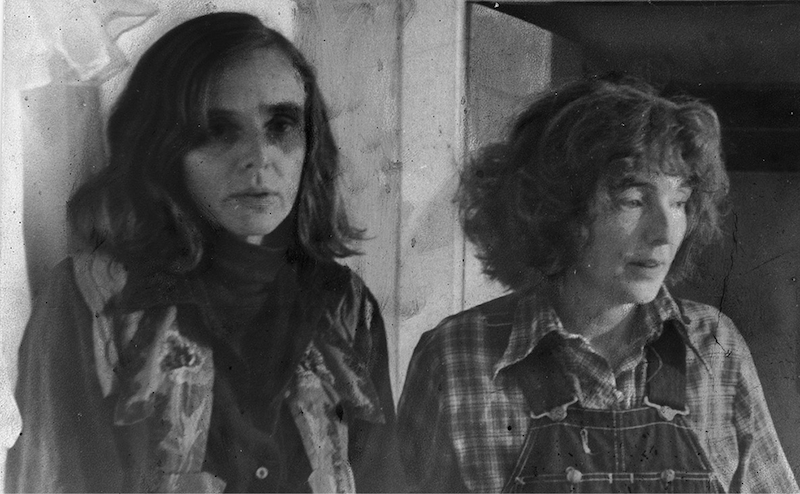
For anyone who's unfamiliar, "Poker Face" follows human lie detector Charlie Cale (Natasha Lyonne) as she gets sucked into "howcatchems" a la Jessica Fletcher and Columbo. In the first season, she's running from a pissed off casino boss; in the second season, the mob is after her ass. Each episode typically features a central crime that isn't properly solved. Maybe the wrong person is accused of murder or a murder has been incorrectly ruled an accidental death... you get the picture. The viewer watches the crime play out, then sees Charlie's involvement and the steps she takes to uncover the truth. The finale pulls everything back to the overarching narrative while introducing new uncertainty to set up the following season. The creator, Rian Johnson ("Knives Out," "Looper," "Brick"), is clearly a film lover, and incorporates many fun references to keep things interesting.
Is the writing always top tier? Eh. Some episodes in S2 challenged my suspension of disbelief, like "One Last Job," the rom-com/heist movie mash-up with Sam Richardson and Corey Hawkins. I can't be mad about it, though, because the scenes at Tandoor Indian Restaurant almost made up for the stupidity of everything else. I wouldn't mind watching "Pride and Prejudice" with Jenny while she spouts off questionable relationship advice. I similarly wasn't a fan of "Hometown Hero," the Minor League Baseball episode where LSD-laced gum plays a pivotal role. Around the middle of the season, the formula starts to become a little stale, which happens with every show like this. The big difference here vs. the "Magnum P.I.s" of yore is the high production value and limited number of episodes each season. It looks like prestige tv, so it can be a little jarring when the writing feels networky.
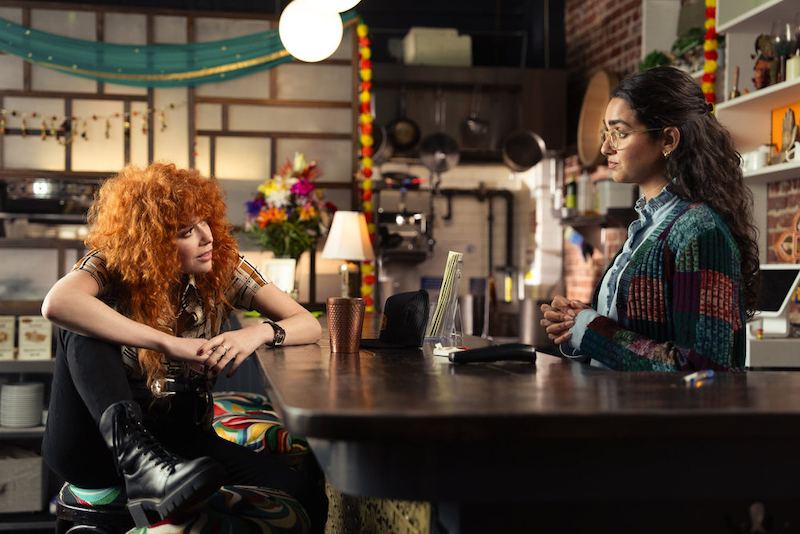
Complaints aside, I have fun watching "Poker Face," and can easily see it entering the comforting rewatch canon unless Lyonne continues to do so much dumb shit that I can no longer look at her face without retching. Only time will tell!
When I learned about Helen Keller in school, all the best parts were omitted. Yes, she totally changed the perception of deaf and blind people through her own achievements and her advocacy, but what about all the times she politely, succinctly, told idiots to go fuck themselves? What about her masterful gift for shade and her 'suffer no fools' mentality? I never learned about her political leanings or the way she championed for civil rights. I, and probably many others, was given the sanitized version of her life with some of the most impactful work unacknowledged.
In the letter I've linked above, Keller is responding to the backlash she received after joining the Socialist Party of Massachusetts in 1909. Prior to this, she had been lauded in the press for her intelligence and her progress. As soon as she came out against capitalism, racism, worker exploitation, poverty, war, etc., those with any modicum of power were eager to discredit her. She was no longer seen as intelligent, but as an empty vessel for propaganda. She now made people uncomfortable because she was no longer adhering to their preconceived notions of her. So what did she do? She told them to stick their antiquated, small-minded opinions where the sun don't shine. Here's Keller's response to the accusation that Anne Sullivan (Mrs. Macy) and her husband, John Macy, indoctrinated her into socialism:
Mr. Macy may be an enthusiastic Marxist propagandist, though I am sorry to say he has not shown much enthusiasm in propagating his Marxism through my fingers. Mrs. Macy is not a Marxist, nor a socialist. Therefore what the Common Cause says about her is not true. The editor must have invented that, made it out of whole cloth, and if that is the way his mind works, it is no wonder that he is opposed to socialism. He has not sufficient sense of fact to be a socialist or anything else intellectually worthwhile.
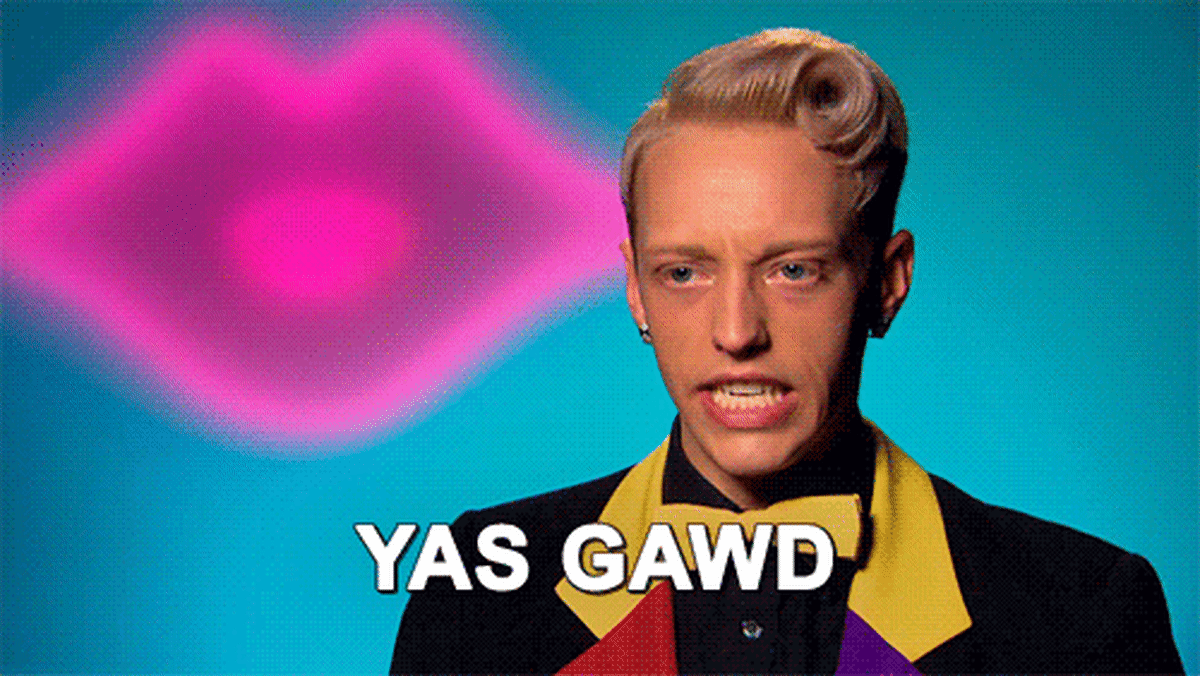
I wrote previously about the importance of identifying a nemesis. I have a few, including several men who write for IndieWire. I would name names if I could remember them [insert Mariah Carey "I don't know her" meme here]. One of my all-time favorite feuds, rivaling Bette Davis and Joan Crawford, is the one between Frisbee, Seth Meyers's Italian greyhound, and Andy Samberg. For as long as I can remember, Samberg has been shit-talking this dog, referring to her as "the worst greyhound since the bus" and "clearly some sort of rat-foreskin hybrid." Here's an incomplete video compilation of his disgust over the years.
Recently, Samberg went on "Good Hang with Amy Poehler" and this transpired (if you can't see it in the email, click here because I'm too lazy to fix the embed issue):
By the time I die, I hope at least one person hates me so much that they delight in my death. If that happens, I'll know I lived a worthwhile life. So, let's all cheers to the very much still alive Frisbee, driving Samberg to the brink of insanity with each breath.
Over Memorial Day weekend, I went to the Met with some friends to finally see Jesse Krimes's "Corrections" exhibit. Right after obtaining his B.A. in studio art, Krimes was arrested for cocaine possession with intent to distribute, and sentenced to six years in prison. While there, he made several mixed-media pieces, but my favorite by far was "Apokaluptein: 16389067," a giant mural-esque installation of 39 prison bedsheets hand-printed using hair gel, a plastic spoon, and newspaper images. Each piece was smuggled out of the prison, sewn together, and unified with colored pencil drawings. In an interview with Title, Krimes describes it as
an attempt to transfer reality into prison, and my metaphorical escape whenever I sent a piece home with the hope that it could be my voice on the outside in the event that anything bad ever happened and I never made it home.
Once released from prison, Krimes iterated on this printing technique with "Rikers Quilt," a piece made during covid in support of the protests happening around the closing of Rikers, and subsequent series that incorporate more traditional folk art elements.

All of this made me curious to learn if there were other men in prison embracing handicrafts, which is what led me to "The Quilters," a fantastic documentary short on Netflix about men in a maximum security prison in Missouri who make quilts for local foster children. Be forewarned: you will cry.
Anddd let's end with an Angela Davis quote for good measure:
To reiterate, rather than try to imagine one single alternative to the existing system of incarceration, we might envision an array of alternatives that will require radical transformations of many aspects of our society. Alternatives that fail to address racism, male dominance, homophobia, class bias, and other structures of domination will not, in the final analysis, lead to decarceration and will not advance the goal of abolition.
I have a bunch of upcoming commitments, so there might be some weeks without Friday Night Dinner. Hopefully I will under promise and over deliver, but TBD. The next time you hear from me, I will have thoughts on Lena Dunham's new show, "Too Much." In the meantime, I'll leave you with something cute as a preemptive apology for my potential absence:
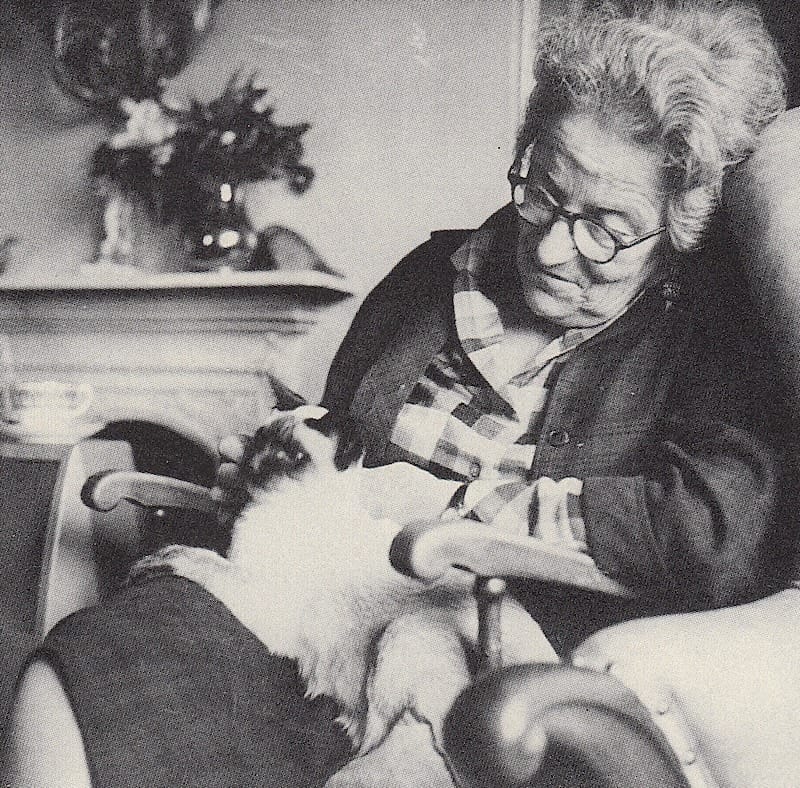
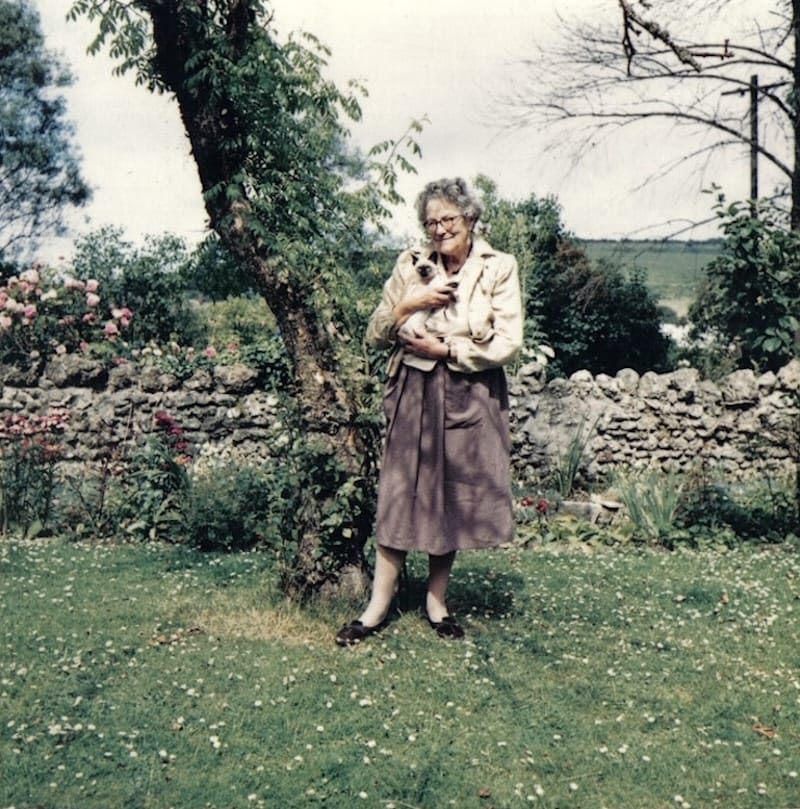
It's Sylvia Townsend Warner with her cat. Idk their name, but "Lolly Willowes" (1926) features a lil scamp named Vinegar.

